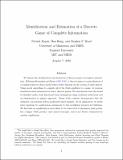Identification and Estimation of a Discrete Game of Complete Information
Author(s)
Bajari, Patrick; Hong, Han; Ryan, Stephen
Downloadgame-stephen-august-2009-revision.pdf (572.2Kb)
OPEN_ACCESS_POLICY
Open Access Policy
Creative Commons Attribution-Noncommercial-Share Alike
Terms of use
Metadata
Show full item recordAbstract
We discuss the identification and estimation of discrete games of complete information. Following Bresnahan and Reiss (1990, 1991), a discrete game is a generalization of a standard discrete choice model where utility depends on the actions of other players. Using recent algorithms to compute all of the Nash equilibria to a game, we propose simulation-based estimators for static, discrete games. We demonstrate that the model is identified under weak functional form assumptions using exclusion restrictions and an identification at infinity approach. Monte Carlo evidence demonstrates that the estimator can perform well in moderately sized samples. As an application, we study entry decisions by construction contractors to bid on highway projects in California. We find that an equilibrium is more likely to be observed if it maximizes joint profits, has a higher Nash product, uses mixed strategies, and is not Pareto dominated by another equilibrium.
Date issued
2010-09Department
Massachusetts Institute of Technology. Department of EconomicsJournal
Econometrica
Publisher
Econometric Society / Wiley
Citation
Bajari, Patrick, Han Hong, and Stephen P. Ryan. “Identification and Estimation of a Discrete Game of Complete Information.” Econometrica 78.5 (2010) : 1529-1568. © 2010 The Econometric Society
Version: Author's final manuscript
ISSN
0012-9682
1468-0262